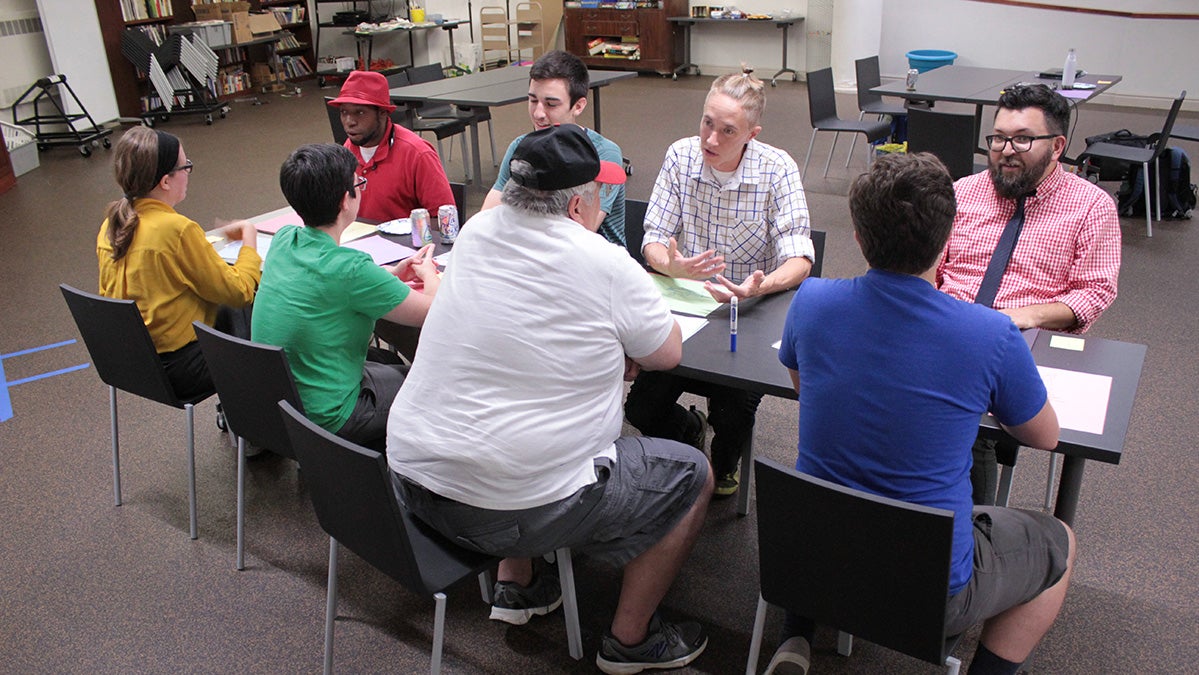Building better cities one application at a time

Members of Code for Pittsburgh
Innovative civic tech groups help stretch city budgets, but are feeling stretched themselves.
Eight people waited expectantly in the basement of a Pittsburgh public library. They sat in pairs around a long table littered with construction paper and markers, Post-It notes and iPhones, waiting for Connor Sites-Bowen to start the speed dating clock.
“So go. Talk. You guys ask questions, you guys answer questions.”
That might seem gruff for a speed dating master of ceremonies, but the event was no ordinary rapid-fire romantic quest. It was a meeting of Code for Pittsburgh, the city’s Code for America brigade, which aims to move government into the digital age.
Instead of swapping ideal first dates, each pair shared civic hacks, or ideas for making everyday city life better. One speed-dater wanted to know what was on the ballot before stepping into the voting booth. Another imagined annotated spaces: being able to walk through a neighborhood and leave a digital note asking about a zoning change, for instance.
The flurry of ideas — some concrete, some far-flung — were indicative of the spirit of civic hacks and civic tech, said Sites-Bowen, Code for Pittsburgh’s brigade captain.
“There’s a mentality among people who do a lot of computer programming that all problems are solvable, it’s just that some are harder to do than other ones,” he said, adding, “If a solution exists, it’s probably not the best possible solution for that thing.”
Civic tech is intellectual crowdfunding: Give people access to the data generated by the government and let them build new and more effective solutions, said Sites-Bowen.
“We have no idea what any given data set could unleash in terms of what people want to do.”
Philadelphia and Pittsburgh publish their data, and invite people to build applications with it. The passage of Pittsburgh’s open data law in 2014 accelerated the process of identifying problems and building solutions, said Debra Lam, the city’s chief innovation and performance officer. It allowed the city to tap into a larger ecosystem of creativity and intellect, and makes the work of her office easier.
“There [are] just general resource constraints. We knew, from local government, we were unable to do everything ourselves,” she said.
Most civic tech groups rely on volunteers and leverage what governments lack: free time. But goodwill is the other currency at work, said David Thornburgh, president and CEO of Committee of Seventy, a government watchdog group in Philadelphia.
“One of the phenomenons that’s become evident as the tech world has blossomed is how much people actually value contributing to something significant and sort of larger than themselves.”
Those efforts have helped cities stretch their budgets. But greater demand for civic tech has stretched the capacity of these volunteers. To avoid burnout, Code for Philly is figuring out how to change the organization. You know, so they can charge for their services. But there’s risk there, too, says the group’s executive director Dawn McDougall.
“We have this mentality of, oh, if we monetize civic tech it feels like, all of a sudden, it’s not quite the same spirit or philosophy. So trying to find that balance between it’s okay for people to make some money on this and if we want to grow it, that’s a big part of it.”
Some groups have successfully made that leap. A product called Cicero, from geospatial company Azavea, helps users identify their federal, state, and local representatives, simply by entering an address.
“It’s actually remarkably hard to to find out who your elected officials are at all the different levels of representation,” said Stephanie Thome, a product manager on Cicero’s data analytics team.
Most of Cicero’s clients are advocacy and nonprofit groups who see the value in helping their constituents connect to elected officials.
“Not knowing who to talk to if you have an issue in your city or in your state means that you do not have a voice in the democratic process,” Thome said.
Despite how much momentum civic tech has gathered, scaling it successfully will be a challenge, said McDougall. She hopes groups like Code for Philly can figure out how to be sustainable. “Government benefits from this so that they can serve citizens better,” she said. “Technology’s moving so quickly and [with] the services that government provides, it’s just too important to not be paying attention to it. And too important to not be contributing to improving it.”
Sites-Bowen, of Code for Pittsburgh, was more expansive.
“Pittsburgh should be a little bit better for every resident, every day. The real heart of this is that like your life is better when your neighbors’ lives are better, and the more we do this, the better things get? And we have no idea how better they’re gonna get.”
WHYY is your source for fact-based, in-depth journalism and information. As a nonprofit organization, we rely on financial support from readers like you. Please give today.


